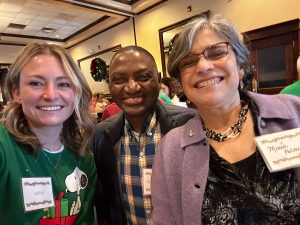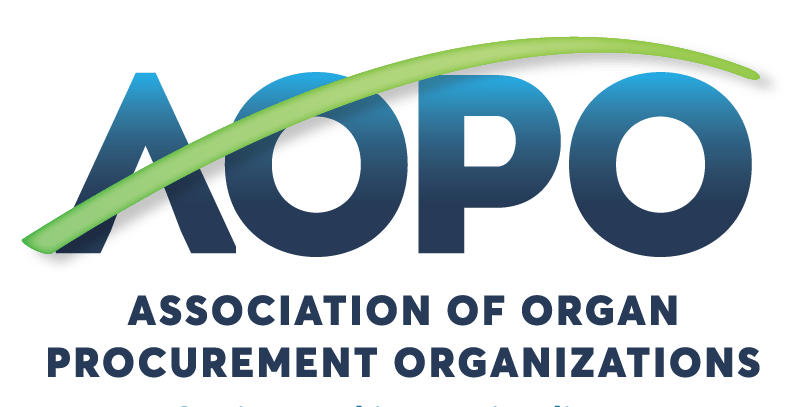For Minority Donor Awareness Month, we recently spoke with Maria Palmer, a dedicated Family Services Coordinator (FSC) at HonorBridge, about her experiences and strategies for effectively reaching the Hispanic community.
Maria’s path to organ donation began with a deeply personal experience—the loss of her brother. This profound event inspired her to join HonorBridge in 2016, where she has since been instrumental in bridging the gap between healthcare providers and Hispanic families.
As a native Spanish speaker, Maria discusses the unique cultural challenges that influence attitudes towards organ donation as well as effective strategies for increasing awareness and understanding within this vital demographic.

Can you briefly tell us about your background, education, role at HonorBridge, and your responsibilities as a Family Services Coordinator (FSC)?
I arrived as an exchange student at Jacksonville State University in Alabama, where I later became a teacher, got married, and attended seminary with my husband. After completing my doctorate in education at UNC, I spent many years as a bi-vocational minister and educator. My journey with organ donation began when my brother passed away, leading me to join HonorBridge in 2016. My diverse background has equipped me well for my role as a FSC, where I educate communities about organ donation and provide practical, emotional, and spiritual support to families.
What are some common misconceptions or myths about organ donation that you encounter in the Hispanic community?
The misconceptions prevalent in the Anglo community are also common in the Hispanic community. For instance, some people fear that doctors might “let them die” to use their organs. Additionally, there are rumors about children being stolen from poor countries and brought to the United States for their organs, or people being kidnapped and forced to donate organs. These are completely unfounded stories if you understand the organ donation process. However, many people lack knowledge about it and already have significant distrust towards the healthcare system.
How do cultural beliefs and traditions influence attitudes towards organ donation among Hispanic families?
There are many rituals associated with death, including some communities wanting to prepare the body (dress their loved one for a wake, for example). Families will spend more money than they have in repatriating the bodies of loved ones so that they can be returned and buried in their native land.
What specific/unique challenges does the Hispanic community face in the United States in regard to organ donation?
The primary issue is our broken immigration system and the barriers to accessing healthcare. Many people who have grown up in the U.S., including residents or those under protected status, cannot get insurance or eventually lose their coverage. When facing a health crisis, they are unable to receive the care they need. I’ve encountered some incredibly tragic cases. For instance, I once had a donor whose cousin was on dialysis. The family wanted him to receive one of the kidneys, but he had lost his job and insurance due to his illness, making him ineligible for assistance. Despite needing a transplant to recover and return to work, he couldn’t get one without insurance. I was amazed that the family still went ahead with donation, even after I had to tell them their own family member could not be a recipient. That took a special kind of grace.
What strategies have you found effective in increasing awareness and understanding of organ donation within the Hispanic community?
When I tell people about my brother being a donor or share personal stories that I’ve been authorized to share, that really has an impact. I also explain the organ donation process and the safeguards in place, ensuring people understand the clear separation between hospital care teams and the organ donation process. It’s crucial for families to know that their doctors would never let them die to use their organs, as the doctors are not involved in any aspect of organ donation.
How do you collaborate with and educate other healthcare professionals to ensure that Hispanic families receive comprehensive and fair support during the organ donation process?
As the FSC, I work as a bridge between families and hospitals. It is a delicate balance, because I am a guest at the hospitals where we work. I often must return many times, so even when I see instances of discrimination or if a family is expressing their displeasure to me, I must be extremely diplomatic and careful. I try my best to empower families to express their needs clearly and connect them with resources and folks who are also advocates or sympathetic.
What additional resources or support do you think would help improve organ donation rates in the Hispanic community?
More culturally appropriate education and outreach. Making connections with thought leaders (pastors, elected officials, influencers, actors, singers, teachers, etc..) and sharing with them our success stories. Also recruiting and retaining more staff who are bilingual and bicultural to work in organ donation. I hope the North Carolina legislature will one day create a fund like the Crime Victims Compensation Fund, where people could apply for help with burial, cremation, or repatriation expenses.
Are there any specific stories or experiences that have left a lasting impact on you?
One case that will always stay with me involves a young man working in construction on the new Central Tower at Duke when he suffered a brain bleed. Despite the doctors’ best efforts, he couldn’t be saved. He had a congenital disease that needed to be monitored and treated, but his family mistakenly believed had been cured after a previous hospitalization. His three brothers were devastated and struggled to contact their parents in a small rural town in Mexico, reluctant to deliver such heartbreaking news. I managed to find a priest in a nearby town who picked up the father and arranged a conference call from his church. I explained the situation to the father, and then the brothers expressed their wish to decline donation and send their brother’s body home. The father responded, “Jesus gave his life for us. This is a small thing compared to that, and we can help somebody.” It was an amazing moment. The following year, during the pandemic, I helped the brothers get vaccinated. In 2022, I met the parents when they visited North Carolina. They are loving and generous people, who shared that they had flown the Donate Life flag I sent during their son’s funeral in Mexico, both out of pride for what he had done and to raise awareness.
In your opinion, what is the biggest need in this community and how do we address that?
I don’t know where to start! All healthcare facilities need bilingual and bicultural staff. Spanish-speakers are now over 10% of the population of NC, and it’s a growing percentage. Bilingualism is not a luxury, it’s a necessity in order to serve the needs of our state’s population. The immigrant community and the second-generation (the native-born, bilingual kids) need better access to preventive care and primary care and also access to affordable urgent care other than the emergency department. We need expanded services at community clinics. It’s not that different from what every North Carolinian needs.
Anything else you’d like to add?
The Hispanic community is a generous, caring community who will work hard to help people in need. I have seen the most amazing acts of generosity and caring, and I have been humbled and honored to be serving these families.
75 lives can be saved and healed from one organ, eye, and tissue donor. Together, we can save lives. Register your decision today at honorbridge.org/registerme



